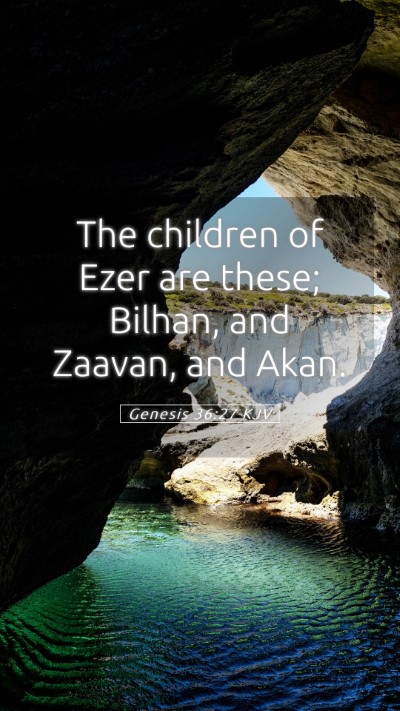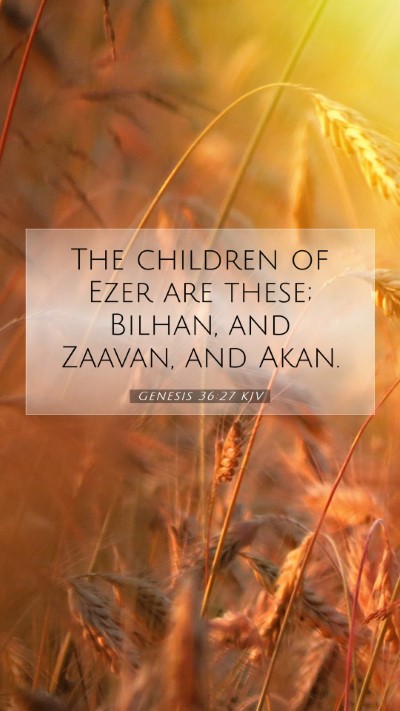Understanding Genesis 36:27
Genesis 36:27 states: "The children of Aholibamah, the daughter of Anah, the daughter of Zibeon, were Jeush, and Jaalam, and Korah." This verse is part of a genealogical record which is essential for historical and cultural context in the scripture. Below, we delve into various insights and analyses provided by public domain commentaries to offer a comprehensive understanding of this verse.
Verse Meaning and Interpretations
Contextual Overview
This verse lists the descendants of Aholibamah, who was one of the wives of Esau. Understanding the genealogies in the Old Testament is crucial as they provide a historical backdrop for the events and characters that follow. Matthew Henry emphasizes that these genealogical records serve to confirm the fulfillment of God’s covenant and promises to Abraham and his descendants.
Insights from Commentaries
-
Matthew Henry's Commentary: Matthew Henry highlights the importance of Aholibamah’s lineage and notes that her offspring played a significant role in the Edomite nations. This is significant in tracing the ancestry linked to the Israelites and understanding their historical relationship with neighboring peoples.
-
Albert Barnes' Notes: Albert Barnes elaborates on the names mentioned, indicating that these names can offer insights into the character and destiny of these descendants. He emphasizes that through these genealogies, we gain insight into God’s providential control over history.
-
Adam Clarke's Commentary: Adam Clarke points out that the mention of Aholibamah suggests the inclusion of multiple names in the genealogical lists, which often reflects the community and family structure of the time. He also notes the prominence of certain names in historical contexts, illustrating that genealogies were integral to identity.
Theological Implications
Genesis 36:27 isn’t just a list of names; it reflects the broader narrative of God’s unfolding plan. Each name represents a lineage that contributes to understanding God’s sovereignty and divine purpose in history. The verse signifies the continuity of family lines, emphasizing that every individual plays a role in the larger divine tapestry.
Key Theological Concepts
- Divine Sovereignty: God orchestrates human history through these lineages.
- Covenantal Promises: The mention of Esau’s descendants links to the broader covenant God made with Abraham.
- Historical Context: Understanding family dynamics and tribal affiliations provides insights into territorial conflicts and alliances in Biblical narratives.
Practical Applications
For modern readers, understanding Genesis 36:27 invites reflection on how ancestry and heritage can shape identity. The study of names and their meanings can lead to profound personal insights about belonging and purpose. It also prompts readers to explore their spiritual genealogy, the beliefs passed down through generations, and the significance of their faith lineage.
How to Apply This Verse
- Explore personal family history and the influences that have shaped your faith journey.
- Engage in biblical study groups that focus on genealogies to deepen your understanding of the Scriptures.
- Consider the implications of divine purpose in your own lineage and community.
Cross References
This verse interacts with other scriptural texts that further illustrate the genealogical significance and divine promises:
- Genesis 25:30 - The narrative of Esau and Jacob, highlighting family rivalry.
- Genesis 36:1 - An introduction to the descendants of Esau which provides context for understanding the verse in focus.
- 1 Chronicles 1:35 - Chronicles of the descendants of Esau, demonstrating the sustained interest in genealogies throughout the Bible.
Conclusion
Genesis 36:27 serves as a reminder of the importance of roots, family heritage, and God's overarching plan in the lives of His people. Through this genealogical account, readers can gain deeper insights into their own spiritual heritage while reflecting on the broader narrative of Scripture. By studying this verse, one gains a clearer understanding of how even the seemingly mundane details of biblical texts reveal the divine orchestration of history and the continuation of God’s promises.


